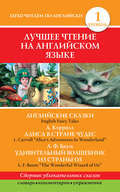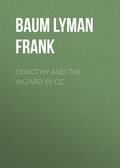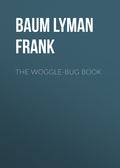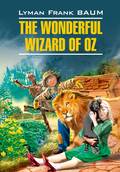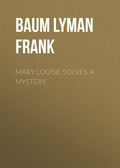
Лаймен Фрэнк Баум
Dot and Tot of Merryland
AUTHOR'S NOTE
The success achieved last year by "The Wonderful Wizard of Oz" – a book that not only ran through many large editions, but brought the author hundreds of letters from interested little folks – has induced me to follow that tale with another, herein presented.
Should "Dot and Tot of Merryland" win the approval of my young friends, I shall be pleased and contented.
In any event Mr. Denslow's quaint and merry pictures, which, in this book excel all his previous work, will be sure to induce happiness in the heart of every beholder.
L. FRANK BAUM.
Chicago, July 1, 1901.
DEDICATION
To ev'ry laughter-loving Tot —
Whether your name be Dot or not;
And may you find a Merryland
Forever lying close at hand.
CHAPTER I. – Roselawn
YOU should have seen Dot as she nestled among the cushions of the carriage on her way to the railway station with her father and governess, Miss Bombien. Her dainty white gown was covered with tucks and puffings and embroideries, as became the dress of the daughter of the wealthy banker who sat smilingly beside her. Her soft, braided white hat had a wide brim that drooped languidly over the pale little face beneath, and broad, white ribbons drew down the brim until all the yellow curls were hidden away. Indeed, the only bits of color about Dot that showed were her deep blue eyes and rosy lips. Even these last were not so rosy as they should have been, for Dot was not in her usual good health, having been confined to the big city house during a long winter and a chill, uncomfortable spring.
But, now that the flowers were blooming and the birds singing in the new-leaved trees, she was going, in charge of her governess, to pass the summer at Roselawn, a beautiful country home her father had recently purchased.
"You must try not to be lonely, dear," said her father, as he held her little hand in his big, strong one. "I have told Miss Bombien to let you run and romp to your heart's content, so the roses may more quickly return to your pale cheeks."
Dot's eyes brightened. To run and romp as she pleased would indeed be a new experience to her, and she was happy even to think of such delight.
"You will have no one but Miss Bombien for company," continued her father; "but there are plenty of servants, and I am told the grounds are in beautiful condition. In a few days, at most, Sweetheart, I shall run down to see you, and then you can tell me how you like your new home. In the meanwhile, Miss Bombien will simply look after your comfort; there will be no lessons to bother you. All you must do is eat and sleep and play, and to grow strong and rosy-cheeked again."
Dot listened to al this with much pleasure, and decided she was about to have a fine holiday. Her real name, by the way, was Evangeline Josephine Freeland; but mamma and papa had always called her "Dot" from the day she was born, so sometimes she almost forgot she had such a beautiful name as Evangeline Josephine.
Dot's mamma was an invalid, and had been taken by her father – Dot's grandfather, you know – for a trip to Europe, in search of better health, and so she had been forced to leave her little daughter to the watchful care of Miss Bombien. Mr. Freeland, although he loved Dot dearly, was a very busy man and could devote but little time to his child. "So, Sweetheart," he told her, "you will be Queen of Roselawn this summer, and I will come down once in a while to bow before your Majesty's throne."
What he really feared was that Dot might grow up weak and delicate as her mother was; but he did not tell the child this. He resolved, however, that if fresh air and healthy surroundings could give his little girl strength and health, they should be at her command, and therefore he had purchased Roselawn almost entirely on Dot's account.
Before she realized it, Dot found herself at the railway station and aboard a parlor car, where her father gave her a long and loving farewell kiss. Then Mr. Freeland stood upon the platform and waved his hand to his daughter, while the train slowly glided out from the station and began its journey into the sweet, fresh country.
Roselawn won the girl's heart at first sight. The cool but sun-kissed mansion seemed delightful after the stuffy, formal city house. It was built in a quaint yet pretty fashion, with many wings and gables and broad verandas on every side. Before it were acres and acres of velvety green lawn, sprinkled with shrubbery and dotted with beds of bright flowers. In every direction were winding paths, covered with white gravel, which led to all parts of the grounds, looking for all the world like a map, Dot thought.
From the first day of her arrival, Dot was all eagerness and joy. Miss Bombien fully obeyed her instructions to let the child run. Dot entered the house only to eat her meals, which she did with growing appetite, and then away she would romp to chase butterflies, visit the stables or poultry yard, or sit near the river bank and watch the driftwood float by. Sometimes a boat danced over the broad, blue waters, and then Dot would jump up and down and clap her hands in ecstasy at the pretty sight. The river soon became her favorite resort, for the green banks and terraces before the house ran down to the water's edge.
Miss Bombien passed her days in hammock swung under a side porch, where she read a great many books and enjoyed herself in her own way. She did not bother to watch Dot, thinking the child could get into no mischief beyond a torn frock or a soiled face.
One morning, having finished her breakfast and scampered out upon the lawn, as usual, Dot chanced to notice a tiny path that led through a small opening in a high and thick hedge. She had never been in this direction before, and although she had often seen the hedge, she had not thought there was a way to pass through it. So a spirit of adventure came over her.
"I'll explore," said Dot to herself.
Pat, pat, patter went the little feet on the gravel, and soon the busy hedge was reached and the opening passed.
Then Dot stopped suddenly and looked around. A cozy little vine-covered cottage nearly surrounded by blooming posies, was before her. From the doorway, however, a path led to Dot's feet, and sitting in the middle of this path, slowly piling pebbles into his broad-brimmed straw hat, was a little boy.
CHAPTER II. – Tot
THE boy was a year or two younger than Dot, and seemed a chubby little fellow as he sat with his legs spread apart and his dark eyes raised wonderingly to the face of his unexpected visitor. Waves of brown hair clustered loosely about his broad forehead, and his dress was neat, though of a coarse material.
He paused in his play and stared hard at Dot for a moment; then dropped his eyes bashfully and ran his fingers through the white pebbles in an embarrassed way.
"Who are you?" asked the girl, in the calm, matter-of-fact tone peculiar to children, while she continued to regard the boy with the interest of a discoverer.
"Tot," was the low reply.
"Tot who?" she demanded.
"Tot Tompum," murmured the boy.
"Tompum! That doesn't mean anything," said Dot, decidedly.
This positive statement seemed to annoy the little fellow. He raised his eyes half shyly a moment and said, in a louder voice:
"Papa Tompum cuts the grass, an' makes the flowers grow. I'm Tot Tompum."
"Oh," said Dot; "you must mean Thompson. Thompson's the gardener, I know, and gardeners make the flowers grow and cut the grass."
The boy nodded his head twice as if to say she was right.
"Gard'ner," he repeated. "Papa Tompum. I'm Tot Tompum."
Then he took courage to look up again, and seeing a friendly smile upon Dot's face he asked boldly, "Who is you?"
"Oh, I'm Dot," she answered, sitting down beside him. "My whole name is Dot Freeland."
"Dot F'eelan'," said Tot.
"Freeland," corrected Dot.
"F'eelan'," said Tot.
"Never mind," laughed the girl; "let us play together. What were you doing with the pebbles?"
"Jack-stones," said the boy, and gravely picking out five of the white pebbles, nearly of one size, he tossed them into the air and tried to catch them on the back of his hand. Two tumbled off, and Dot laughed. The boy laughed, too, and tried it again. Before long they had become fast friends, and were laughing and chatting together as happily as if they had known one another for months.
Tot's mother, hearing their voices, came to the door of her cottage; but seeing her boy's new playmate was "the young lady at the mansion," she smiled and returned to her work.
Presently Dot jumped up.
"Come, Tot," she cried, "let us go where your father is working. I saw him weeding one of the flower beds this morning."
Tot scrambled to his feet and poured the white pebbles from his hat, after which he placed it upon the back of his head; so far back, indeed, that Dot wondered why it did not tumble off.
"We'll go see Papa Tompum," he said, trotting along beside his new friend.
Thompson, the gardener, was quite surprised to see his little boy holding fast to the hand of the rich banker's daughter, and chatting away as frankly as if he had known her for years; but Thompson had learned by this time that Dot ruled everyone about the place and did exactly as she pleased, so he made no protest. As he watched the children running about the grounds where Tot was usually forbidden to play, Thompson felt proud that his boy had been selected by "the young lady" for so high and honorable a position as her playmate.
He made no protest when they raced across a flower bed and left the prints of their small feet upon the soft earth, for Dot held Tot firmly by the hand, and he obediently followed wherever she led. The big red roses attracted her fancy, and she ruthlessly plucked a handful and stuck them in rows around the rim of Tot's hat as well as her own, although the poor gardener, who had tended these flowers so patiently that they had become precious in his eyes, actually winced and shivered with dismay at witnessing the careless and, to him, cruel manner in which the young mistress of the house destroyed them. But Dot knew they were her property and enjoyed the roses in her own way; while Tot, although he may have felt guilty, wisely shifted all responsibility to his companion, and admired the royal way in which she accepted everything about the place as her very own.
When the luncheon gong sounded from the big house, and Dot left Tot to obey the summons, she said to him, "Tomorrow I will bring a basket of sandwiches and cake, and we'll have a picnic down by the river bank."
"All right!" answered Tot, and trotted away toward his father's cottage.
It had been an eventful day to him, for he had found a delightful playmate.
CHAPTER III. – The Boat
Early next morning Dot came out of the house with a basket on her arm so big and heavy she could hardly carry it. Indeed, she stopped several times between the house and the gap in the big hedge to set the basket down while she rested. Once she was sorely tempted to chase a pretty butterfly that fluttered lazily over the lawn near by; but a glance at the basket and a thought of Tot recalled her to the fact that this was "a picnic day," and so she trudged steadily on and passed through the hedge.
Tot was sitting on the door-step waiting for her. He wore a clean sailor waist and blue brownie overalls, and his face and hands had been freshly washed for the important occasion.
When he saw Dot's basket his eyes grew big and round, and he asked, "What you got?"
"Oh, that's our lunch," said the girl, setting down her burden with a sigh of relief.
"What's lunch?" demanded Tot.
"Why – something to eat, you know," she answered.
"Oh," said Tot. Then he looked at the basket with new interest and asked, "Basket all full somefin' t'eat?"
"Yes," replied Dot, with some pride. "I begged cook to give me all the good things she had in the pantry, 'cause you and I are going to have a picnic, and eat our lunch down by the river. So she filled it way up to the top, 'cause cook always does anything I ask. And it's a great big basket, Tot, too."
"Yes," answered Tot, gravely, "big basket!" Then he jumped up and, all eagerness, approached the basket.
"Let's eat it!" he exclaimed.
"Oh, no," cried Dot reprovingly. "It isn't time for lunch yet. And I've just had my breakfast. But we'll go down to the river and start the picnic right away. And, if you're good, Tot, perhaps I'll give you just one piece of jelly-cake before lunch time."
Tot's mother came out and kissed her boy good-bye, and then he and Dot took hold of the handle of the big basket and started for the river.
Of course, it took them a long time to get there, for often they set down the basket to pick flowers or watch a robin redbreast carrying food to its nest full of babies, or to run over the soft, close-cropped grass and chase each other, in very joyful and good spirits.
But they always returned to the basket, and at last carried it down to the water's edge, where they placed it upon a large, flat stone.
"That will be our table, when it's time for lunch," said Dot.
"Time now," remarked Tot, wistfully.
"Not yet," said the girl, "but you shall have the jelly-cake, 'cause there's plenty to last all day."
So she drew aside the white cloth that covered the basket and took out two big slices of cake, one for Tot and one for herself. While they ate it, they walked along the shore. The river was entirely deserted by boats, for it was a warm day and even the fisher folk did not care to be out. On the opposite shore were great walls of rock rising up from the river, but at the foot of the cliffs were bushy trees that lined the further edge of the water.
"Just like whiskers," said Tot.
"So they are, from here," agreed Dot; "but if we were on the other side of the river we would find them to be big trees. It's because they are so far away that they look like the river's whiskers."
They walked farther along the shore until they were past the grounds of Roselawn, and then, turning a little bend in the river, they came to some low bushes growing down by the water.
"Oh, Tot," cried the girl, "wouldn't it be nice to lunch under those trees, where it is cool and shady? Let us go back and fetch the basket."
Tot followed obediently, for he recognized Dot as the leader not only because she was older, but because she possessed the wonderful basket of good things. They walked back to the big stone where they had left the basket, and after a good deal of labor managed to carry it to the grove of low trees. Pushing the branches aside, they crept through the bushes until they reached the edge of the river, and then Dot uttered an exclamation of delight.
"Here's a boat!" she said. "And a pretty boat, too. I wonder whom it belongs to. But never mind, there's no one here; so we will climb into it and eat our luncheon on the seats."
It really was a pretty boat, painted all white, except for a red stripe running along the outer edge. There was a broad seat at each end and two seats in the middle, and in the bottom of the boat, under the seats, were two oars.
One end of the boat was drawn up on the shore, while the rest of it lay quietly upon the water; but the branches of the trees threw a cool shade over all, and it seemed to Dot and Tot the most pleasant place to eat their luncheon.
They carried the basket to the broad seat farthest out in the water, and Dot spread her white cloth over it, and laid upon that all the good things cook had put into her basket.
"Let's play house," said Tot.
"Not house," corrected Dot; "we'll play this is a ship, and we're on a trip across the ocean. Won't it be jolly?"
Sitting upon the bottom of the boat, close to the seat which formed their table, they laughed and talked and ate their luncheon with the keen appetites all healthy children have.
The time passed so quickly they never knew how long they sat there; but suddenly Tot exclaimed, "It's hot!" and put on his hat to keep the sun from his head.
Dot looked up, surprised to find that the sun was indeed shining full upon them. Then she noticed that the shade of the trees was gone and only the blue of the sky was over the boat.
She stood up and gave a little cry of dismay.
"We're in the river, Tot," she said; "the boat has got away!"
CHAPTER IV. – Under the Cliffs
Tot scrambled to his feet and sat upon a seat of the boat, holding fast to the sides with both hands. As he looked around and saw the boat was far from land, he smiled and nodded his head, saying, "Now we'll play ship, an' ride on 'e ocean. Won't we, Dot F'eelun'?"
"Oh, Tot!" exclaimed the little girl; "I'm afraid we'll be drowned. How can we ever get home again?"
"Ride in 'e boat," said Tot, composedly.
"But the boat is carrying us farther away every minute. We're floating downstream; and by-and-by we'll come to the ocean, where there are big waves," declared Dot, who was really frightened.
But Tot refused to be afraid. As the swift current carried them along, he clapped his hands together joyfully and gave a little laugh of delight. "Nice ride!" he said again and again. "Hooray!"
Dot was older and wiser. She knew a boat could be rowed by means of oars, and there were two oars lying on the bottom of the boat. She decided to make an attempt to reach the shore, for then someone might be found to help them back to Roselawn, which they had now left far behind.
She drew out one of the oars and with difficulty, for it was heavy for the child to handle, managed to push one end into the water and rest the other against the row-lock of the boat. Then she began to row as hard as she could; but her strength was not great, and all she did was to push the front of the boat half around, so that it headed toward the rocky cliffs on the far side of the river.
Her efforts pleased Tot, who laughed merrily as the oar splashed in the water; but Dot was determined to get to land if possible and struggled desperately at her task.
The boat was still headed toward the rocky cliffs, when suddenly the oar flew out of Dot's hands and she fell backward off the seat.
She was not hurt, but when she got up she saw the oar floating in the water, out of her reach; still she was reassured to notice that the boat was now gliding swiftly along, and presently, to her joy, she saw it was headed directly toward the fringe of trees, and getting nearer to the bank every moment.
"It must be another current, Tot," she cried, "and this one is taking us to the shore. So I did some good by rowing, even if I lost the oar."
Tot nodded, but said nothing. He was still enjoying the novel boat ride. Dot sat down on the seat beside him, and they watched the shore grow nearer and more distinct every moment as the boat glided steadily on.
The trees were bigger than they had thought, and grew close down to the water's edge. Dot became worried when she noticed the speed of the boat increasing as they drew nearer to the shore.
"If we bump those trees," she said, "we may be hurt, and the branches will scratch our faces dreadfully."
Tot stopped smiling when he heard this, and took hold of Dot's hand, which he clasped tightly in his own.
The next moment, still speeding onward, the boat reached the trees. The two children were caught by the branches, swept quickly from the seat, and sent sprawling at the bottom of the boat. But the boat itself never stopped an instant. There was just room for it to float underneath the thick branches, and instead of bumping into the shore, the water carried it through a small opening in the face of the rocky cliff, and then, in total darkness, it continued swiftly on its way!
Dot and Tot, who were both startled by this unexpected danger, managed to get up and sit together upon the seat of the boat; but they could see nothing before them and only a faint light behind, where they had entered this hidden tunnel in the cliff.
For some moments they sat in silence. Then Dot reached out her hand to see if she could feel anything; but the cool, damp air was all around them. Then she reached upward, and her hand struck against a piece of projecting rock which hurt her.
"Tot," she whispered, "I think we'd better lie down in the bottom of the boat. The roof isn't very high up, and it may bump our heads if we sit here."
Tot slipped off the seat at once and stretched himself out on the boards underneath. Dot quickly followed him, and then for a time they lay very still in the darkness, listening to the water as it rippled softly along the sides of the boat.
Presently the girl asked, "Are you frightened, Tot?"
"Not, much," was the hesitating answer; and then, after a long pause, he added, "but some."
"Oh, I'm some frightened myself," said Dot. "But I don't know what we can do."
"I know," declared Tot, solemnly.
"What?" she inquired, in an anxious voice.
"Nuthin'."
Dot saw no need of replying to this, and another long period of silence followed.
They did not seem to be in any immediate danger, for the boat swept along with a free, easy motion that was very pleasant, and the air was delightfully cool after the heat of the sun outside in the open river.
But two things worried Dot. One was the fact that she was being carried a long ways from home, and the other a fear of where the underground river might lead them. She wasn't at all sure they were not floating down into the middle of the earth, and the chances of ever seeing Roselawn again were growing smaller every minute.
Nothing seemed to worry Tot, however. The darkness and the murmuring of the water made him drowsy, and before long he was fast asleep, with his chubby little arms clasped around Dot's neck.
The girl was also gradually recovering from her fright, since nothing terrible seemed to happen. They were having a long journey under the cliffs; but she knew there must come an end to it some time, and probably they would float out of the dark tunnel into the daylight sooner or later.
On and on sped the little boat, until at last, as Dot lay staring into the darkness, she noticed a dim light about her, and began to see the rocky roof of the cavern through which they were passing.
Then she sat up, and, far away in the distance, she saw a round, bright spot that reminded her of a full moon. It seemed to be getting nearer and bigger, and finally she gave a cry of joy and awakened her companion.
"Tot! Oh, Tot!" she called. "We've got to the end at last and are coming out of the tunnel!"
Tot sat up and rubbed his eyes. He gave one careless glance at the opening, and then turned his eyes upon the lunch basket, saying, sleepily, "I'm hungry!"



